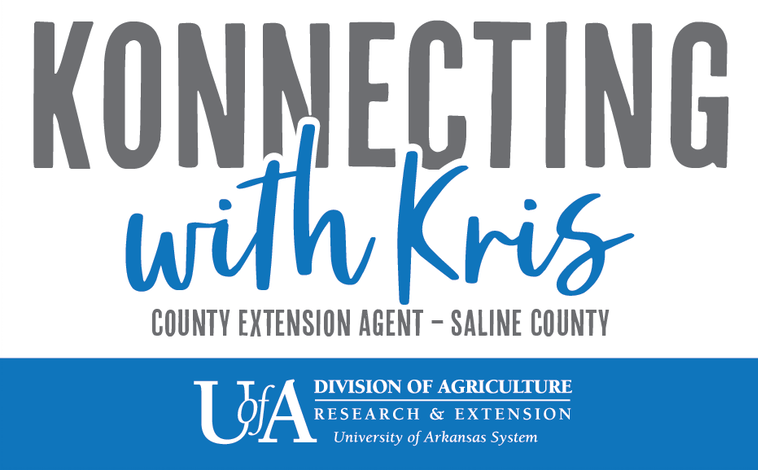The Power of Optimism
Contact
Kris Boulton
Phone: (501) 303-5672
Email: kboulton@uada.edu

University of Arkansas System Division of Agriculture
Cooperative Extension Service
1605 Edison Ave.
Benton, AR 72015

Konnecting with Kris Blog
Connect with Saline County FCS agent Kris Boulton.
The Power of Optimism
It is common to believe that the people who are mentally healthy are those who are realistic, who judge accurately what they can do and what they can't do. We sometimes chide people who try to do too much: "Be realistic."
That might not be good advice. Research shows that people who are realistic are more likely to be depressed. People who think they can do more than they actually can, tend to be healthier mentally and physically; optimism is a healthy frame of mind. But there are several habits that can keep us from enjoying optimism.
Blame does not help
When we make mistakes, it is easy to think: "I am so stupid! I keep making the same mistakes! When am I going to learn?" Such blame can keep us trapped in a negative pattern of thinking and acting. There is a better way.
We can challenge our negative thoughts
For example, when we make a mistake, it is helpful to say: "I've made a mistake similar to mistakes I've made in the past. But I keep learning something new every time. I'm glad I can keep learning and trying."
Do the things you can do
None of us can solve all our problems at once. But there are little things we can do that help. We can keep trying. We can try new ways. We can get ideas from books and other people.
Get outside yourself
Rather than dwell on feelings of failure, get busy helping or building or learning. Rather than trying to talk yourself into being happy, find a way you can be productive. Sometimes we think we must start feeling better before we can move forward. The opposite is more often the case: We must start doing something in order to start feeling better.
Train yourself to notice when you are beating up on yourself. When you notice it, challenge the negative thoughts in the same way you would if a good friend were saying the same things about herself that you are saying about yourself. See yourself as a person who tries hard and does your best. Get busy. Be patient with yourself. Be hopeful about the future.
Enjoy the present and look forward to the future
Every day there are things that might go wrong. We have a choice; we can worry about them and dread what may happen or enjoy the present and look forward to the future. Whatever problems tomorrow brings, we can deal with them. Look forward to the good things you have planned. Enjoy your opportunities to work and be productive now. Seize the day and all its opportunities and tomorrow will take care of itself.
Applications:
Try to recall a time when you were upset with yourself. Consider whether you used the following three unhelpful ways of thinking:
- Personal: "It is my I am to blame."
- Permanent: "I have always done I never seem to learn."
- Pervasive: "I seem to make the same mistakes in all Nothing ever goes right for me."
Most of us have had thoughts like those at times. But the healthiest people are those who learn to challenge the thoughts and replace them with more helpful thoughts. See if you can apply the following more optimistic thoughts to a situation where you have felt like a failure.
- Personal: "That was an especially hard But I learned things that will help me do better."
- Permanent: "That is a mistake I have made before but each time I learn something "
- Pervasive: "I still have trouble in one area but overall, I am doing much "
Sometimes when we feel pessimistic or downhearted, we can push ourselves to move on to something that needs to be done. Other times we find it almost impossible to get started. At such times it can be helpful to have a list of things you find satisfaction in doing. Maybe you like to listen to music, organize your desk, take a walk . . . What are some of the active things you can be prepared to do at times when you find it hard to get started?
Recommended reading:
If you enjoy reading books about psychology, you would probably enjoy "Learned Optimism" by Martin E. P. Seligman. He describes the finding that people can be trained to feel and act helpless; they do not do what they can do to solve their problems. He provides examples of the many areas of life in which optimism makes people successful. He also shows how to challenge our negative thoughts.